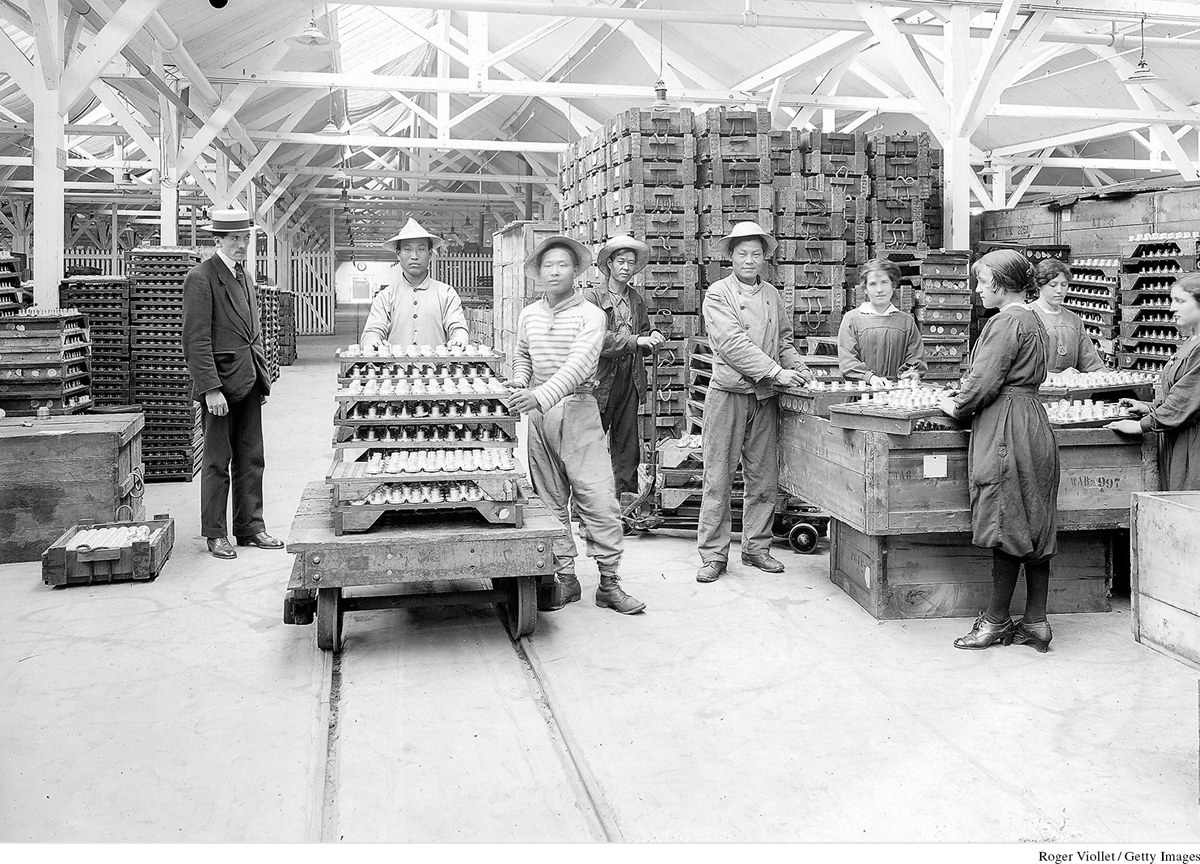The Home Front
The Home Front
Total war demanded the involvement of civilians in manufacturing shells, machine guns, poisonous gases, bombs, airplanes, and eventually tanks—which together formed the backbone of technological warfare. Increased production of coffins, canes, wheelchairs, and artificial limbs (devised by the likes of Jules Amar) was also required. Because their armies would have utterly failed without them, civilians had to believe in the war and to work overtime and sacrifice for victory. To keep the war machine operating smoothly, governments oversaw factories, transportation systems, and the use of resources. People accepted tight government control as necessary to win the war.
At first, most political parties put aside their differences. Many socialists and working-class people who had formerly criticized the military buildup announced their support for the war. For decades, socialist parties had preached that “the worker has no country” and that nationalism was an ideology meant to keep workers disunited and subjected to the will of their employers. In August 1914, however, most socialists became as patriotic as the rest of society. Although many feminists actively opposed the conflict, the British suffrage leader Emmeline Pankhurst and her daughter Christabel were among those who became militant nationalists. In the name of victory, national leaders wanted to end political division of all kinds: “I no longer recognize [political] parties,” William II declared on August 4, 1914. “I recognize only Germans.” Those who had been at the receiving end of discrimination promoted unity. One rabbi proudly echoed the kaiser: “In the German fatherland there are no longer any Christians and Jews, any believers and disbelievers, there are only Germans.”
Governments mobilized the home front with varying degrees of success. War ministries set up boards to allocate labor on both the home front and the battlefront and to give industrialists financial incentives to encourage productivity. The Russian bureaucracy, however, only cooperated halfheartedly with industrialists and other groups that could aid the war effort. In several countries, emergency measures allowed the drafting of both men and women for military or industrial service. Municipal governments set up canteens and day-care centers, but rural Russia, Austria-Hungary, Bulgaria, and Serbia, where youths, women, and old men struggled to sustain farms, had no such relief programs.
Governments throughout Europe passed sedition laws that made it a crime to criticize war-related policies and created propaganda agencies, sometimes fabricating atrocities, to advertise the war as a patriotic mission to resist villainous enemies. (See “Seeing History: Portraying Soldiers in World War I.”) In Russia, Tsar Nicholas II had changed the German-sounding name of the capital St. Petersburg to the Russian Petrograd as a patriotic move. Maintaining that Armenians in the Ottoman Empire were plotting against the Central Powers, the Ottomans drove those Armenians living in Turkey from their homes, forcing them onto long marches or into concentration camps where they were murdered or simply died. The Allies also caused the deaths of civilians en masse by creating famines, blockading the Syrian provinces of the Ottoman Empire in hopes that the people there would rebel or die of starvation.
Despite widespread popular support for the war, some individuals worked to bring about a negotiated peace. In 1915, activists in the international women’s movement met in The Hague to call for an end to the war. “We can no longer endure . . . brute force as the only solution of international disputes,” declared Dutch physician Aletta Jacobs. The women had no success, though many brought their cause to individual heads of state. In Austria-Hungary, agitating for ethnic self-determination, the Czechs undertook a vigorous anti-Habsburg campaign, while Croats, Slovenes, and Serbs in the Balkans formed a committee to plan a southern Slavic state independent of Austria-Hungary. The Allies encouraged such independence movements as part of their strategy to defeat Austria-Hungary.
The war upset the social order as well as the political one. In the war’s early days, many women lost their jobs when luxury shops, textile factories, and other nonessential businesses closed. As more and more men left for the trenches, women who had lost employment elsewhere joined with low-paid domestic workers to take over higher-paying jobs in munitions and metallurgical industries. In Warsaw women drove trucks, and in London they conducted streetcars. Some young women drove ambulances and nursed the wounded near the front lines.
Women’s assumption of men’s jobs looked to many like a sign of social disorder. In the words of one metalworker, women were “sending men to the slaughter.” Men feared that women would remain in the workforce after the war, robbing men of the breadwinner role. Others criticized young female munitions workers for squandering their pay on ribbons and jewelry. The heated prewar debates over the “new woman” and gender roles returned.

REVIEW QUESTION In what ways was World War I a total war?
Although soldiers from different backgrounds often felt bonds of solidarity in the trenches, difficult wartime conditions increasingly pitted civilians against one another on the home front. Workers toiled long hours with less to eat, while many in the upper classes bought fancy food and fashionable clothing on the black market (outside the official system of rationing). The cost of living surged and thus contributed to social tensions as shortages of staples like bread, sugar, and meat occurred across Europe and people went hungry. Reviving prewar anti-Semitism, some blamed Jews for the shortages. Colonial populations suffered oppressive conditions as well. The French forcibly transported some 100,000 Vietnamese to work in France for the war effort. Africans also faced grueling forced labor along with skyrocketing taxes and prices. Civilian suffering during the war, whether in the colonies or in Europe, laid the groundwork for ordinary people to take political action.